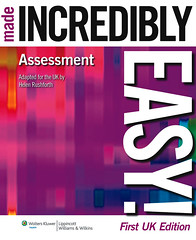An important feature of the assessment process is the selection of assessment instruments. This selection depends on the particular problem being addressed as well as the range of problems that the clinician may be called upon to evaluate which is apparently quite extensive. Most of these activities take four basic forms

Are psychological assessments reliable?
by Brendon
Find out how these assessments can be made reliable by considering the possible processes followed.
Assessment encompasses the following four basic forms:
-
Appraisal of diverse mental abilities, especially intellectual functions
-
Evaluation of more specific abilities, aptitudes or defects
-
Differential diagnoses, or determining which of several diagnostic categories best characterizes the client
-
Appraisal of personality traits
During these evaluations, clinicians rely on several different techniques, including interviews, structured psychological tests, personality inventories and questionnaires and direct behavioural observations. Certain assessment problems may require the use of any or all of these procedures depending on the nature and complexity of the issues involved. Furthermore, the theoretical orientation of the clinician also influences the types of techniques employed. For example, behaviourally orientated clinicians rely extensively on behavioural observations and descriptions when conducting assessments, whereas more dynamically orientated diagnosticians routinely use psychological tests to evaluate underlying personality traits and identify areas of conflict.
However, techniques should be selected on the basis of their proven ability to address particular issues. In order to evaluate their quality they were examined paying special attention to statistical properties such as reliability and validity.
Reliability refers to the consistency of test data across different conditions which can be evaluated in three ways:
-
Split-half reliability refers to the internal consistency of the test and concerns the extent to which a comparison of internal items, such as even versus odd items, yields comparable results
-
Test-retest reliability concerns the extent to which consecutive administrations of a test to the same individual yield consistent results
-
Inter-rater reliability is a measure of the extent to which two or more individuals administering the same test or measure will achieve comparable results
Validity, on the other hand, refers to the accuracy of a particular test in measuring targeted traits or characteristics which can be addressed in four ways:
-
Content validity addresses the issue of whether test items appear to reflect characteristics of a condition that are generally agreed upon. For example, anxiety orientated questionnaires would include content pertaining to such characteristics such as sweaty palms or an upset stomachs
-
Concurrent validity evaluates the results of one test to other tests designed to assess the same trait or characteristic
-
Predictive validity refers to the ability of a test to predict behavior
-
Lastly, construct validity refers to the extent to which a theoretical construct, such as a personality trait can be empirically defined in observations.
You might also like
The nature and assessment of mental disordersAbnormal behavior could be viewed as the result of underlying mental disorder...
5 Suggestions To Help You Feel Better Right NowSome proven suggestions on how you can improve your mood quickly and with ve...














 The importance of using web analyticson 05/11/2019
The importance of using web analyticson 05/11/2019
 The nature and assessment of mental disorderson 05/11/2016
The nature and assessment of mental disorderson 05/11/2016



Comments
Brendon, Which theoretical orientation and which technique appear to be the most reliable and successful?